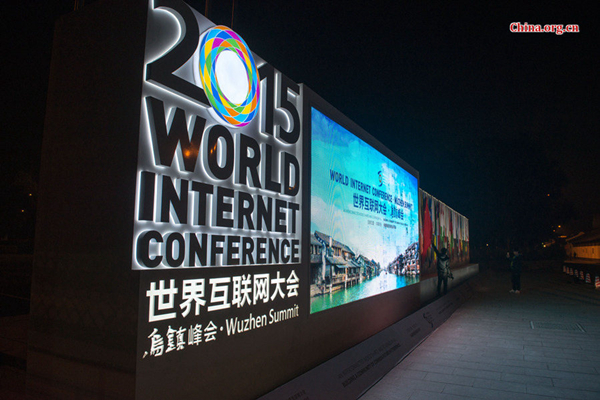Lessons of e-commerce explosion in China
- By Dan Steinbock
 0 Comment(s)
0 Comment(s) Print
Print E-mail China.org.cn, December 16, 2015
E-mail China.org.cn, December 16, 2015
|
|
|
The second World Internet Conference, to be held from December 16 to 18, promotes green transport. Guests and journalists who commute between different locations will take pure electric vehicles and are encouraged to borrow rent-free "intelligent bikes." [Photo by Chen Boyuan / China.org.cn] |
The second World Internet Conference (WIC), also known as the Wuzhen Summit, will take place Dec 16 -18, in Wuzhen, Zhejiang. Chinese President Xi Jinping will attend the conference and address the opening ceremony. It takes place amid dramatic expansion of Chinese e-commerce, thanks to great market potential and government's supportive policies.
In early spring, the State Council, China's cabinet, announced it will boost e-commerce by cutting red tape and liberalizing investment regulation in the sector. Meanwhile, Premier Li Keqiang said that with the "Internet Plus" strategy China would back e-commerce development and guide the Chinese Internet companies' international expansion.
In the mainland, e-commerce and other Internet-based industries are supporting and accelerating the rebalancing of the Chinese economy toward consumption and innovation. Only months ago, I predicted that "China's e-commerce will shake the world." The first act ensued only a few weeks ago.
Records in global e-commerce and domestic consumption
In early November, the sales on the Singles Day - the Chinese version of the U.S. Valentine's Day - morphed into a huge shopping extravaganza as the mainland consumers' buying spree caused sales to soar almost 60 percent from last year. Although Alibaba, the e-commerce giant, started the online festival only seven years ago, its total sales alone climbed to RMB 92 billion ($14.3 billion).
To put the figure into an international perspective, it is more than quadruple the U.S. earnings last year from its Black Friday and Cyber Monday sales events combined. Unsurprisingly, Alibaba's founder Jack Ma believes that "Singles Day… will go global. In the next five years, I believe it may be in Tokyo, Paris or New York."
Alibaba expects the number of middle-class to grow from 300 million to 500 million over the next 15 years. Dramatic market expansion is energizing intense rivalry in which even Alibaba must cope with growing competition - from its nemesis Tencent to alternative business models and specialized services, including JD.com, Vishop and Dang Dang.
As China's growth is slowing, Chinese living standards continue to grow fast. The deceleration of growth supports social spending, which drives Chinese consumer welfare as per capita incomes are likely to double in 2010-20. Chinese e-commerce is driven by heavy online buyers, younger demographics, and consumers in the relatively wealthier first-tier cities - although relative growth is even faster in many lower-tier cities and rural areas.






